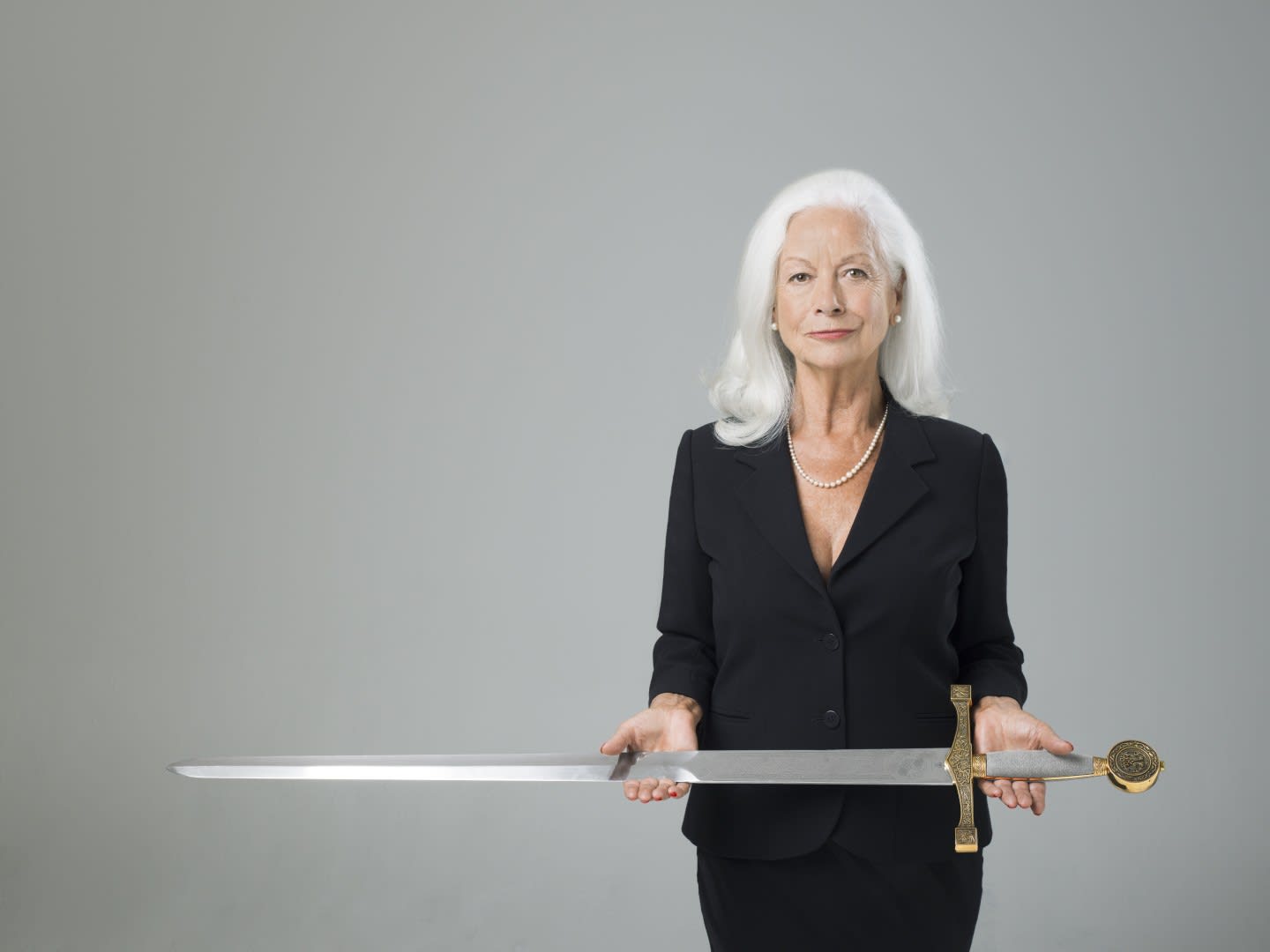Born into a military family in 1943, Scilla Elworthy could shoot a gun aged 11. But her life has been one dedicated to peace and nonviolence. Straying far from the career as a wife and mother she imagines her family would have envisaged for her, in 1982 she founded Oxford Research Group ‘to develop effective dialogue between nuclear weapons policy-makers worldwide and their critics’. Twenty years later she founded Peace Direct – the charity committed to stopping wars – and her 2012 TED talk on nonviolence has been viewed over 1,200,000 times. Here the three-time Nobel Peace Prize nominee talks presence, empathy and her 2017 book, The Business Plan for Peace, with Sam Bennett.
In the first episode of Jimmy McGovern’s Cracker, criminal psychologist Dr Fitzgerald gives a lecture in which he literally chucks books by Freud and other clever people out into the audience, reading out the author’s name with each throw. “End of lecture,” he then jokes, before advising the students to lock themselves away in a room and study themselves; what they feel, not what they’re supposed to feel. “When you've studied,” he says, “shed light on the dark recesses of your soul, that is the time to pick up a book.”
It’s the first thing I think of when reading the eighth chapter of Scilla Elworthy’s The Business Plan for Peace, which also champions study of self. “Absolutely,” she says when I ask if the comparison I’ve drawn is a fair one, “it's being willing to go into our own dark sides, face what's there and walk towards it rather than shut it down, that eventually gives us many valuable things like balance, like presence, when really frightening things happen – do you understand what I mean by presence?”
“I think so,” I say. “I could do with you explaining.”
“When we’re suddenly faced with a crisis, maybe a knife fight in the street, presence is required, which means being able to be calm in the face of turbulence, upheaval, fear and anger. It's comparatively easy to learn the skills to do that, and they require deep breathing as an automatic reaction, going into one's heart instead of one's head, because the head tends to panic but the heart knows how to understand what's happening in terms of the psyche of the other people involved. Once you can be present to what's happening in the person who is causing the violence, you have a much greater chance of meeting them rather than fighting them.”
I point out that families of knife crime victims, for example, might find it difficult to adopt such an approach. “I'm sure they would find it difficult, I certainly found it difficult when I lost a brother in a very violent car accident – it's very hard to feel [presence] is a possibility. All I'm suggesting is those of us who want to be compassionate and effective need to practice these skills.” The hope would be to not have to use them, she adds, “but we need to practice them so they're available when any of these sorts of things arise. If you're suddenly very severely criticised by a professor or a superior or even a colleague, you need to be able to be in a position not to simply react but resort to your inner resources. Empathy, really, empathy is what you can resort to when you're in a very tight corner.
“Self-awareness and self-reflection are so essential to the effectiveness of what we do in the world,” she tells me. She wishes she’d started such practice sooner, having not really done so until her third decade. “When I was 30 I got a brain disease called encephalitis which is 60 percent fatal in South Africa where I was, and it left me in a state of very bad migraines for six years. All I could think about in my foggy brain was this question: who am I? It was actually the great benefit of that disease and its aftermath that I began to try and answer that question. But I didn't really get to grips with that until I was about 34 or 35; if I was living my teens now, I would definitely start some form of yoga, meditation or self-reflection much earlier.” Many young people today are doing these things, “I’m happy to say.”
The Business Plan for Peace begins thus: ‘We live in a world in crisis. Those who are even half awake realise this, but many feel helpless and powerless and shut down in face of what they see on TV or read in the news.’ Do we all have a responsibility to follow the news? “Yes,” the writer begins, “but I think a lot depends on how we deal with our inner feelings when we watch or read the news. It's easy to just be reactive and think ‘what a bunch of idiots’ or ‘how stupid’ and not really engage.” Instead we should properly consider “what the probable feelings are of relatives of Isis fighters fleeing to Idlib in terror. We should identify with even – I dare say it – the confusion and helplessness of a lot of MPs in the face of Brexit. I think it's important we be conscious of the feelings we have, otherwise we're just laying on another level of reactivity and there's already quite enough of that.”
Regarding her three Nobel Peace Prize nominations, I wonder what her reaction to each one was. “I didn't even know, they don't tell you.” She recollects finding out about one of them. “Somebody who had been part of the organisation that nominated me told somebody else, and they told me, but it didn't come through for a long time. To be honest, and I'm not being pseudo modest, I didn't take much notice because I thought immediately, ‘I know 10,000 other people who deserve it much more that I do so I hope one of them gets it.’ It's true right now; I know so many people whose courage, fortitude and resilience is just humbling: they're the people who should be nominated and receive such a prize.”
Her nominations came as a result of her work with Oxford Research Group. When she first set the organisation up, and was going about the research, she found herself underestimated due to her gender. She would attend meetings “of very senior military people or military academics, which would usually be in London at a very formal venue”. At one of these “there was a question about nuclear weapons costings and I knew that those costings didn't include the cost of decommissioning nuclear weapons and therefore were inaccurate.” She put up her hand to ask about this. “I prefixed the question with a couple of sentences and was interrupted by the chairman when I was halfway through my explanation. He just bellowed at me, ‘Question, madam!’ It was that kind of thing, being treated as a nuisance or somebody who's the wrong gender to be any use to such a discussion, and also being thought of as uninformed or impertinent.”
Bellowing is not something I imagine she does a lot of herself, nor do I reckon she launches the remote control across the lounge when it’s misbehaving. “I get very angry internally,” she says. “When have I lost my temper?” She thinks back to when she was 18 or 19, “working in refugee camps, mainly for Vietnamese refugees. I was outraged by the incredible unfairness and disrespect with which they were treated, and regrettably I think I did lose my temper then. I don't much now. I'm sort of conscious of being angry but I don't often vent it.” If she were to, it would mean having to rebuild whatever relationship it had affected. “You can't storm out angrily and not do damage.”
We’re speaking some time ahead of her appearance at Oxford Human Rights Festival this month. What can we expect from her there? “I haven't even thought about it yet,” she laughs, “what would you like to have from my appearance?” She resumes, “I’d like to be of service, I don't like to make speeches just for the sake of it, and I never, ever repeat some formulaic thing.” Usually for events like this she’ll contact the organisers a day or two prior to establish exactly what they’d like her to talk about, “what they'd like to know, what I can supply, what students are curious about in terms of this subject, because I don't want to just witter on about stuff that doesn't interest them.”
She hopes to bring copies of The Business Plan for Peace with her, “a very easy read full of examples of what people do locally as well as internationally to build peace – those examples are useful to people.” It was published 18 months ago, after which she thought she’d be free to “go and think about things, dig my garden and whatnot – but no such luck. The response has been so incredible that we're now forming an organisation to put a lot of the initiatives in the book into action. That includes methodology to get more women into negotiating peace agreements. Why? When women are included in peace processes, there is a 20 percent increase in the probability of an agreement lasting at least two years, and a 35 percent increase in the probability of an agreement lasting at least 15 years. Why? Because male negotiators (often previous combatants) are primarily concerned with territory, resources and positions of power, while women bring to the table the concerns of orphans, the injured, the bereaved and the traumatised. The result is that the cycle of violence can be more effectively interrupted and turned around.
“We’re also working on divestment from weapons companies, starting with the endowment funds of major US universities, and working with NATO nations to develop a conflict prevention budget alongside their defence budget. So, it's pretty nonstop, but it's all passionately interesting.” She amends her statement, “Interesting's too mild a word. I think it's probably the most vibrant and energy producing work anybody could do. I get very tired because I'm 75, but I just love the work and couldn't really do anything else.”
Meanwhile in my significantly less impressive life, perhaps it’s time to lock myself away and actually go into my dark sides. Best start now, it’s going to take longer than a Cracker episode, believe me.
Scilla Elworthy is at Oxford Human Rights Festival 13 March, 6-7pm, JHB Main Lecture Theatre, Oxford Brookes. The Business Plan for Peace is available now at scillaelworthy.com










